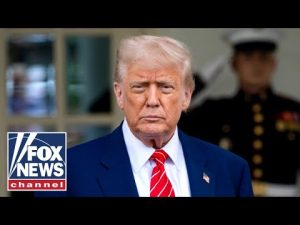**Title: Tariffs: A Strategic Gamble or Risky Business?**
In the colorful world of politics, few topics spark as much debate as tariffs. Recently, at a dialogue event, the discussion turned to the impact of former President Trump’s fluctuating tariff policies. While some see these moves as a clever strategy to boost American bargaining power in international trade, others are more cautious, questioning the long-term effects on the economy and America’s global standing.
The conversation kicked off with an intriguing question about whether Trump’s tariffs could hinder America’s credibility on the world stage. But rather than creating distrust, it seems that Trump’s approach has achieved the opposite. Countries like Japan, South Korea, and Vietnam are reportedly flocking to negotiate better deals. It’s reminiscent of a master chess player, who strategically sacrifices a pawn to force the opponent’s hand. By implementing high tariffs, Trump has pushed these nations to sit down at the negotiating table—a brilliant tactic meant to level the playing field.
One of the primary goals of this tariff strategy is to boost American exports, particularly our abundant liquid natural gas and top-notch beef. These countries are being asked to buy more American products in exchange for better trade agreements. It’s not just about Tariffs 101; it’s a game of leverage aiming to reduce reliance on countries like China, all while keeping American jobs and industries thriving. It’s like convincing a friend to swap their sandwich for your grandma’s famous cookies—once they see the value, who can resist?
However, the discussion didn’t shy away from concerns. Critics of Trump’s tariff strategy point out that while a baseline tariff of around 10% might sound reasonable, fluctuating tariffs can create an atmosphere of uncertainty. It’s a bit like trying to catch a butterfly while riding a rollercoaster—exciting yet unpredictable. The up-and-down nature of tariffs can lead to market volatility, leaving many scratching their heads in confusion. Clear goals could ease these fears, allowing businesses to plan accordingly instead of relying on gut feelings.
Digging deeper into the conversation, the “madman theory” of political strategy came into play. This theory posits that unpredictability can serve as a powerful tool in negotiations. Trump’s unpredictable tariff policy has left many guessing, thus keeping other nations on their toes. It’s much like a magician performing a disappearing act: while everyone is watching his left hand, significant moves are made with the right. While this might not sit well with everyone, it could well lead to more favorable outcomes for the United States.
As the dialogue came to a close, it was clear that the world of tariffs is complex, filled with risks and rewards. While there are valid concerns about the continuous imposition of these trade barriers, there’s also an intriguing opportunity for America to reposition itself in the global economy. It’s a gamble that the American people seem willing to take, but it leaves many wondering if the payoff will outshine the potential pitfalls. One thing’s for sure: in the world of international trade, it’s not just about playing the game; it’s about playing to win.







